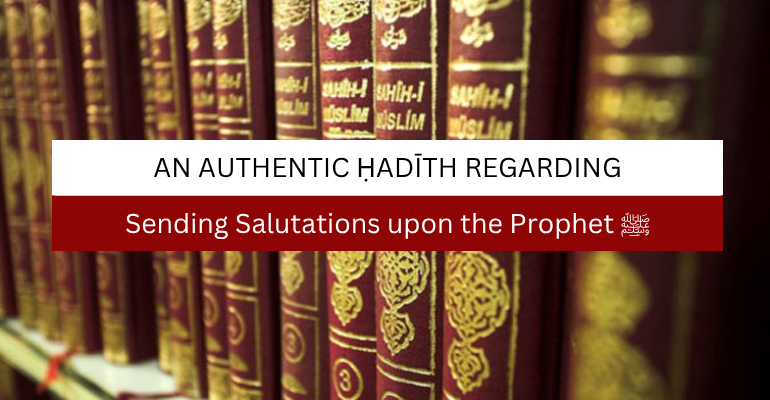Whoever sends a single ṣalāh upon me, Allāh will send salutations and blessings upon him ten fold.
Narrator(s): Abu Hurayrah.
Reference: Ṣaḥīḥ Muslim.
Commentary:
- The meaning of “Whoever sends a single ṣalāh upon me” i.e. whoever seeks closeness to Allāh by saying:
- “Sal Allāhu ‘alayhi wa sallam”
- “Allāhumma ṣalli ‘alā Muḥammad kamā ṣallayta ‘alā ibrāhīma…” to the end of as-ṣalāh al-ibrāhīmiyyah;
- or any other form of ṣalāh which is permitted.
- The meaning of “Allāh sending ṣalāh upon the Prophet” is either:
- Bestowing His mercy upon him.
- Praising His prophet among the angels.
- There is no limit to how many times a person should send ṣalāh upon the Prophet ﷺ, in fact an abundance of doing so indicates the love a person has for him.
- A Muslim should send ṣalāh upon the Prophet ﷺ any time, and all the time; it is further emphasised to send ṣalāh upon him:
- When his name is mentioned.
- After the athān.
- On Friday before Jumu’ah salah.
- Whenever his name is mentioned.
- After tashahhud in ṣalāh. This is done by saying as-ṣalāh al-ibrāhīmiyyah.
- When entering and leaving the masjid.
- In Du’ā, after praising Allāh.
- In any sitting or gathering.
- In the Janāzah salah, after the 2nd takbīr.
Related Āyāt:
- {Verily, Allāh sends salutations of praise upon the Prophet and His angels do as well. O you who believe, send ṣalāh upon him and salutations of peace} [33:56]
Related narrations:
- The Prophet ﷺ said, “Whenever one of you supplicates, he should begin by praising and extolling Allāh, then sending ṣalāh upon the Prophet ﷺ, thereafter he can supplicate for whatever he requires…” [At-Tirmidhī]
- The Prophet ﷺ said, “The closest of the people to me on the Day of Resurrection are those who most often invoked blessings upon me.” [At-Tirmidhī]
- Abul ‘Āliyah said, “Ṣalāh of Allāh upon His Prophet means: Allāh praising His Prophet among the angels in the higher abode.” [Al-Bukhārī]
“عن أبي هريرة – رضي الله عنه – أن النبي قال: “كمَنْ صَلَّى عَلَيَّ وَاحِدَةً ، صَلَّى الله بِها عَلَيْهِ عَشْرًا
[صحيح مسلم]

